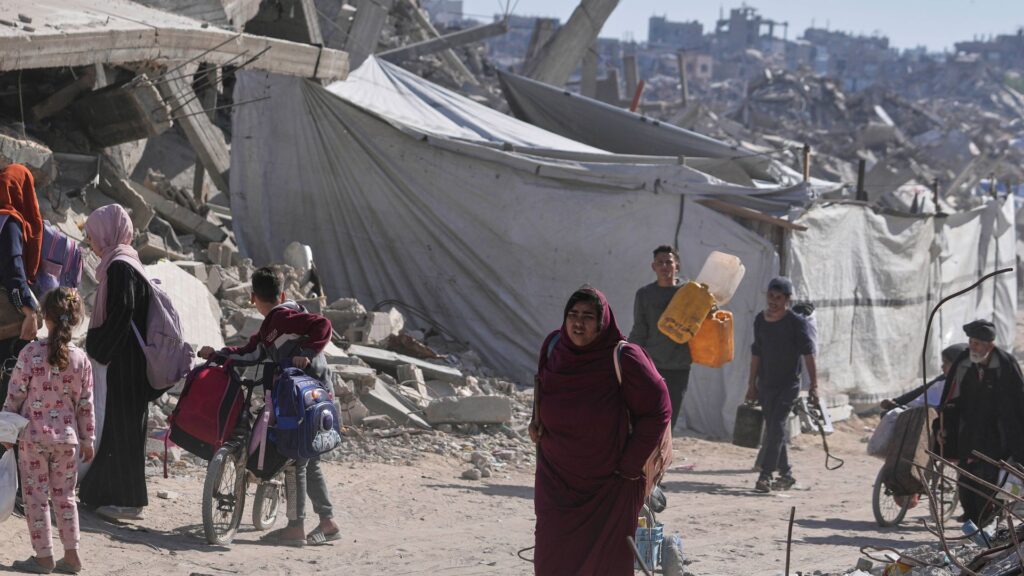As Israel launches a new offensive in Gaza dubbed Operation Gideon’s Chariots, the United Nations human rights chief said the situation facing Palestinians in the region is “tantamount to ethnic cleansing.” The escalation comes a day after President Donald Trump concluded his Middle East tour without visiting Israel, but acknowledging the widespread starvation and humanitarian crisis gripping the Gaza Strip.
In the wake of those fresh attacks, Hamas confirmed Saturday, May 17, that it was involved in renewed ceasefire negotiations with Israel. A previous ceasefire agreement broke down in March after Israel launched overnight attacks into Gaza, killing more than 300 people.
UN accuses Israel of ‘ethnic cleansing’
In a statement released Friday, May 16, U.N. Human Rights Chief Volker Türk said, “This latest barrage of bombs, forcing people to move amid the threat of intensified attacks, the methodical destruction of entire neighborhoods, and the denial of humanitarian assistance underline that there appears to be a push for a permanent demographic shift in Gaza that is in defiance of international law and is tantamount to ethnic cleansing.”
What is ‘Operation Gideon’s Chariots’?
On Saturday, Israel announced its new operation, Gideon’s Chariots, which Defense Minister Israel Katz said was being led with “great force,” according to The Associated Press.
In the past 24 hours, Gideon’s Chariots has killed more than 150 people, Gaza’s Health Ministry stated. That includes eight people, four of whom were children, in a northern refugee camp on Saturday. Another 14 people were killed in central Gaza, including parents and four children, when their home was attacked.
While Israel hasn’t commented on the strikes, the country did say in a statement that dozens of fighters were killed during an operation that dismantled an “underground route” in northern Gaza, according to reporting from the AP.
In addition to the increased air strikes, Operation Gideon’s Chariots calls for a buildup of troops along Gaza’s borders to control more of the territory, and ultimately “achieve all of the war goals in Gaza,” which includes the release of all of the remaining hostages held by Hamas.
In a post on X Friday, the Israeli Defense Forces said, “The IDF has begun conducting extensive strikes and mobilizing troops to achieve operational control in the areas of Gaza, over the past day,” adding, “This is part of preparations to expand operations and fulfill the objectives of the war — including the release of hostages and the dismantling of the Hamas terrorist organization.”
While nearly 60 hostages, both dead and alive, are believed to be held by Hamas, the Palestinian Commission of Detainees Affairs reports that more than 10,100 Palestinians are detained in Israel, including more than 400 children. On Monday, May 12, Hamas released the last living American-born hostage in exchange for “unspecified gestures the U.S. promised.” Israel refuted the idea that any concessions had been made.
Trump acknowledges humanitarian crisis
Israel has continued to increase its military operations following the breakdown of a ceasefire agreement in March. Since then, nearly 430,000 people have been forcibly displaced, according to UNRWA, the U.N.’s Palestinian refugee agency. In total, the IDF has issued at least 22 displacement orders since March 18, resulting in the displacement of roughly 1.9 million Palestinians. Israel now controls some 70% of Gaza.
Speaking to reporters at the end of his Middle East tour on Friday, Trump acknowledged the crisis in Gaza, saying, “We’re looking at Gaza and we got to get that taken care of. A lot of people are starving. A lot of people. There’s a lot of bad things going on.”
Without going into specifics, Trump said he thinks “a lot of good things are going to happen over the next month,” adding, “We have to help also out the Palestinians.”
At the same time, however, Trump reiterated his calls for the United States to take over Gaza while relocating the roughly 2 million Palestinians who call it home. During a round table in Doha, the capital of Qatar, on Thursday, May 15, Trump said he has “concepts for Gaza that I think are very good: Make it a freedom zone, let the United States get involved.”
In response to the comments, a Hamas official, Basem Naim, conceded that Trump “possesses the necessary influence” to end the war in Gaza, but clarified, “Gaza is an integral part of Palestinian land – it is not real estate for sale on the open market.”


